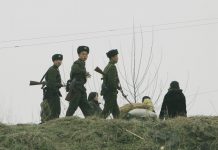The price of fertilizer in South Korea has recently skyrocketed due to massive shortages of urea, a situation which is also playing out in North Korea. Daily NK recently learned that the lack of urea imported from China has significantly disrupted fertilizer production, leading to rises in grain prices and causing anxiety among many North Koreans.
“The shortage of raw materials from China has persisted ever since the COVID-19 border closure,” a Daily NK source in South Pyongan Province reported on Feb. 1. “Fertilizer production has taken a major hit because the cost of raw materials for inorganic fertilizer has jumped considerably.”
In Oct. 2021, China tightened export regulations around the raw materials used to make nitrophosphate fertilizer, including urea (the main raw material), and other materials used in the process, such as ammonium chloride and ammonium nitrate. Consequently, South Korea’s fertilizer industry – which has long depended on China for most urea imports – is suffering. North Korea has been greatly impacted by Chinese new import regulations because it has long relied on China for urea imports as well.
Relatedly, the Namhung Youth Chemical Complex (North Korea’s most prominent fertilizer factory) witnessed significant falls in production because of shortages of imported raw materials. There were fears at the time that production could stop altogether if the raw material problem remained unresolved.

The source explained that the current situation regarding the import of raw materials is no better than before and is actually worsening.
Although North Korean authorities have implemented measures to permit trade activities to solve the urea shortage, these measures have not yet led to clear results.
Daily NK’s source also claimed that the urea crisis is impacting grain prices in the country.
“The sudden rise in the price of raw materials used in fertilizer production has led to a rise in grain prices,” the source said. “The rise in fertilizer prices has led to a fall in supply of fertilizer needed for agricultural production, which, in turn, has caused a decrease in agricultural yields.”
North Korea is still unable to import much grains from overseas despite the fact that agricultural yields were comparatively smaller last year because of fertilizer shortages. In short, the source’s report suggests that decreases in the country’s grain supply have caused grain prices to rise. Indeed, grain prices may rise even further if there is an increase in the number of people hoarding grains ahead of the annual “barley hump,” which occurs before rice and corn is harvested in July and August.
In fact, according to Daily NK’s grain price data, the price of corn (in Pyongyang) has risen by about 15% in the space of around four months, from KPW 2,000 in early October last year to KPW 2,300 in January this year.
“The price of fertilizer this year will increase twofold compared to last year,” the source predicted, adding, “At present, farms generally use urea fertilizer, so agricultural output will be affected if the urea shortage continues.”
In sum, North Korea may continue to experience the following “vicious cycle”: as long as the urea shortage continues, lower fertilizer production will continue to lead to falling agricultural production and increases in grain prices.
Please direct any comments or questions about this article to dailynkenglish@uni-media.net.

















